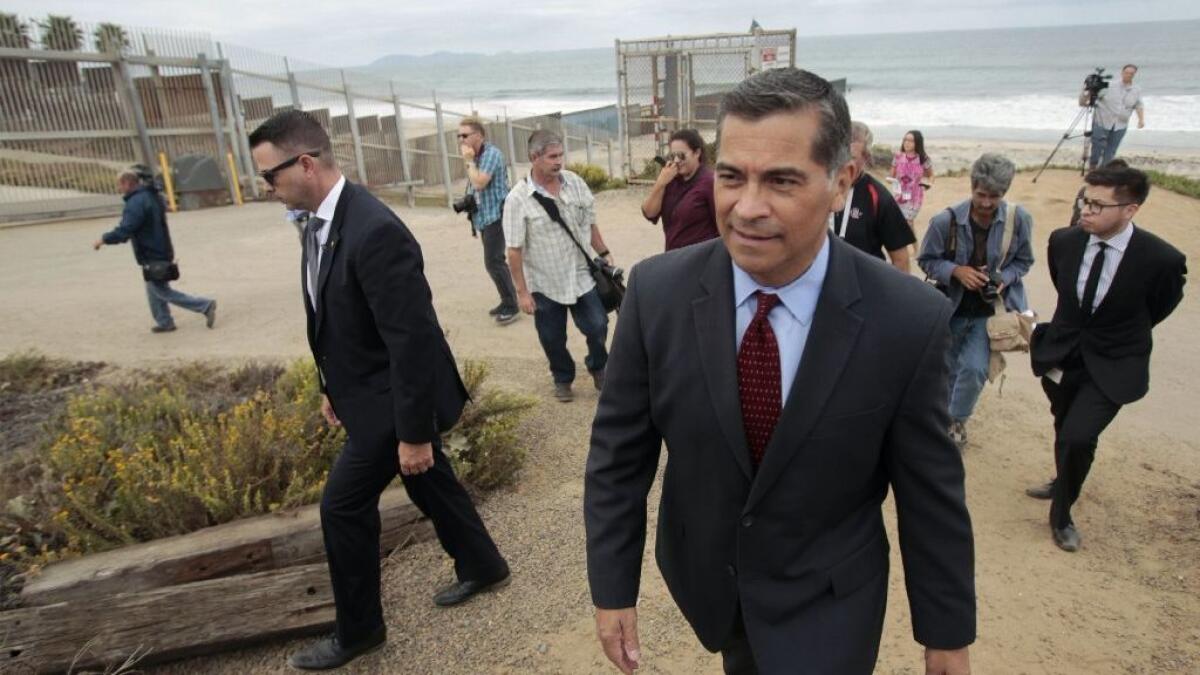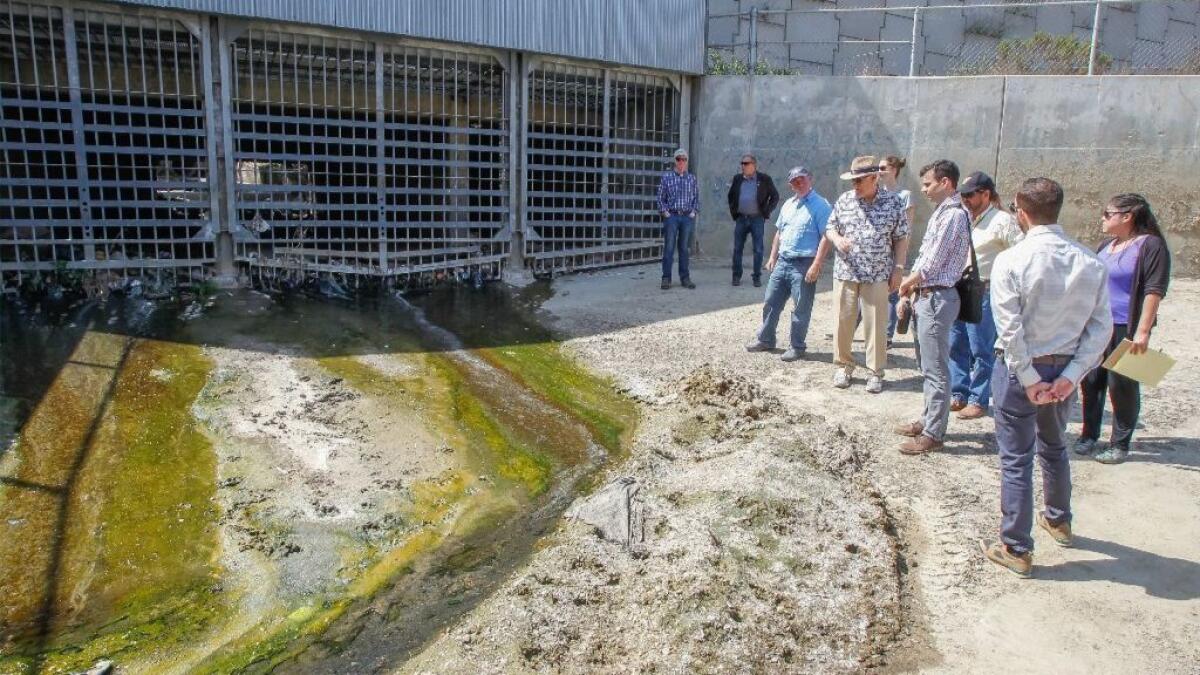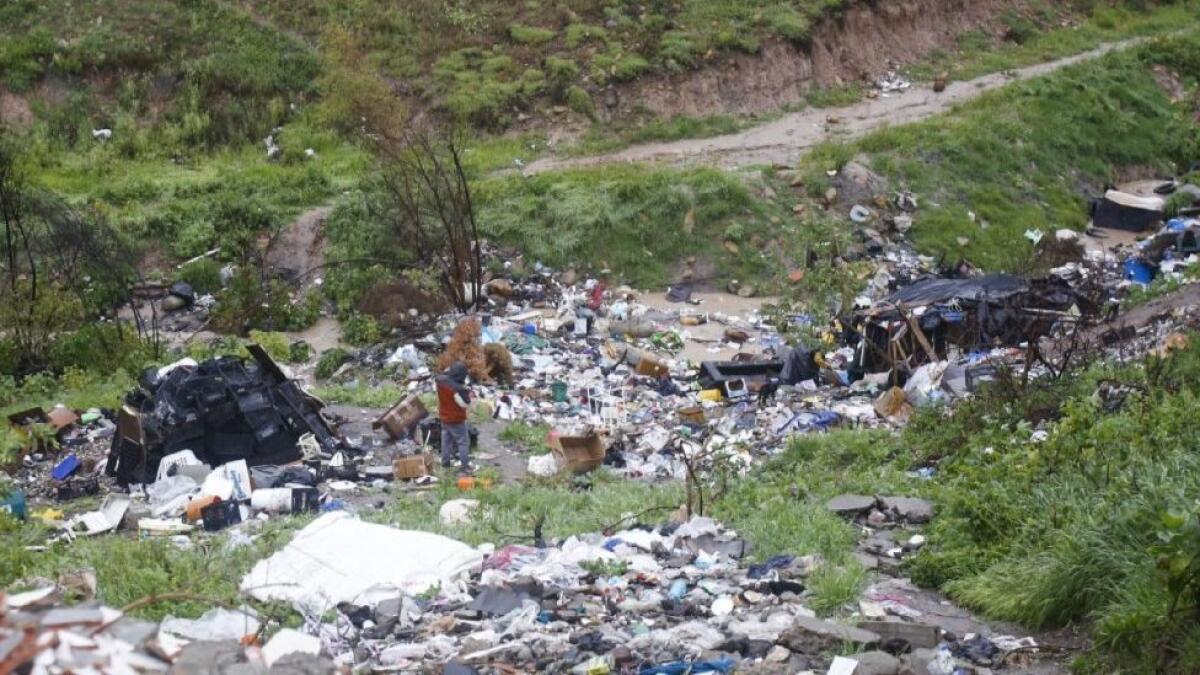Becerra sues feds over Tijuana sewage spilling over border into California

- Share via
Reporting from San Diego — California Atty. Gen. Xavier Becerra filed a lawsuit Tuesday night against the Trump administration, alleging that the federal government violated the Clean Water Act by allowing, in recent years, millions of gallons of raw sewage, heavy metals and other contamination to routinely spill from Tijuana into San Diego.
Toxic water pollution from Mexico shuttered San Diego beaches located near the Tijuana River Valley on more than 500 days in the last three years, according to the complaint.
The lawsuit — which specifically targets the U.S. section of the International Boundary and Water Commission, or IBWC — paints a picture of a negligent and dismissive federal agency failing to follow through on its responsibility to address cross-border issues with Mexico.
“While the federal government has invested in other border issues, they haven’t invested in these water-quality issues,” said Dave Gibson, executive officer of the San Diego Regional Water Quality Control Board, which filed the lawsuit jointly with the state attorney general.
“California taxpayers shouldn’t expect that their money go to fix this when it’s the responsibility of the federal government,” he said.
The IBWC and the U.S. Department of Justice declined to comment, citing the litigation.
In the past, agency officials have said they have little authority over the congressional funding needed to improve the situation.
The state’s lawsuit follows a similar legal strategy launched by San Diego officials after a spill last year sent hundreds of millions of gallons of raw sewage flowing down the Tijuana River into the Pacific Ocean, fouling beaches as far north as Coronado.
Following failed talks with the IBWC, Imperial Beach, Chula Vista and the Port of San Diego filed a lawsuit against the federal agency in March alleging sweeping violations of Clean Water Act.
The San Diego chapter of the Surfrider Foundation filed a similar lawsuit in July.
The plaintiffs argued that because the IBWC controls a flood-control channel that redirects the Tijuana River on its way to the Pacific Ocean, as well as water-capture basins in five canyons along the border, the agency is responsible for the pollution that often escapes those systems.
The canyon collectors and pumps on the Tijuana River are intended to divert polluted flows to the South Bay International Wastewater Treatment Plant west of San Ysidro.
“We’ve learned that small spills when they’re really toxic can have a huge impact on public health, and if IBWC were doing their job it wouldn’t happen,” Imperial Beach Mayor Serge Dedina said.
Lawyers for the agency have said that the government isn’t legally responsible for the flows that escape the collection systems, pointing out that the situation would be significantly worse without its efforts.
Before the federal government spent roughly $344 million to create the diversion and treatment system in the 1990s, millions of gallons of sewage would flow daily down the Tijuana River into San Diego County.

The state’s lawsuit takes a narrower approach than that of the local cities. It focuses specifically on the maintenance and operation of the collector basins, which are designed to funnel water that runs through the canyons to the wastewater treatment plant during dry weather.
The lawsuit alleges that the IBWC has failed to keep the diversion pumps free of debris, leading to a clogged system that allows the basins to overflow into the surrounding areas.
The complaint also says the agency has failed to document and report spills on a number of occasions in recent years.
As foul-smelling, often black, polluted water has bypassed the collection systems, it has reportedly affected Border Patrol agents working in the area, as well as residents and farmers in the Tijuana River Valley.
Union officials with the National Border Patrol Council have said they have also considered filing a lawsuit against the federal government to force more action on the issue.
“We’re trying not to go down that road, but we don’t want our people to be getting chemical burns or getting sick or dying early because they won’t clean it up,” said Christopher Harris, a border agent in San Diego for 20 years and the secretary for the local Border Patrol union.
joshua.smith@sduniontribune.com
Smith writes for the San Diego Union-Tribune.

More to Read
Sign up for Essential California
The most important California stories and recommendations in your inbox every morning.
You may occasionally receive promotional content from the Los Angeles Times.













